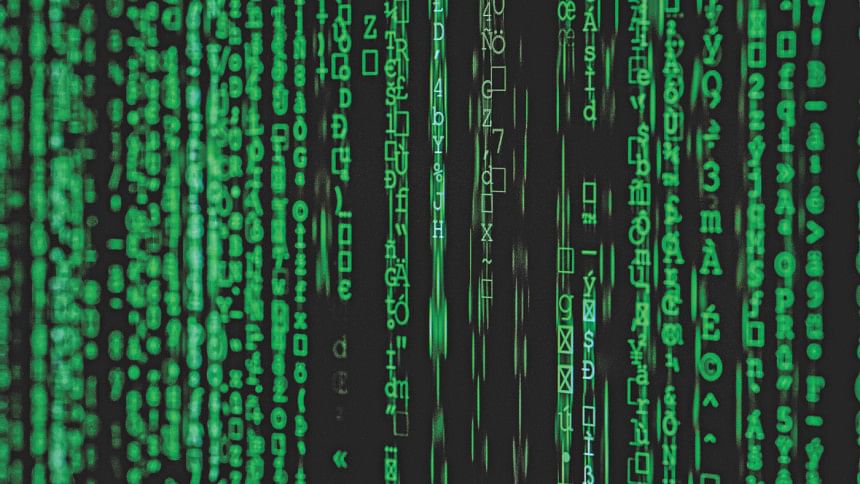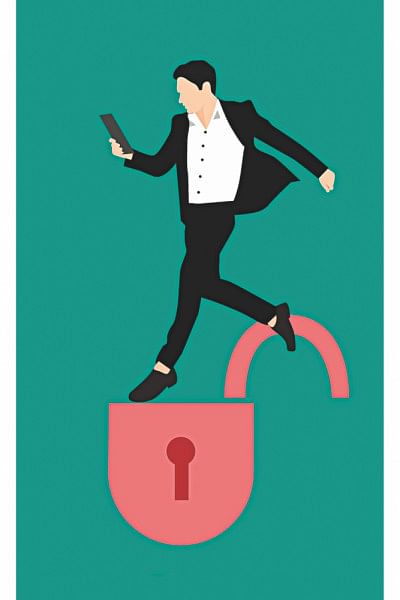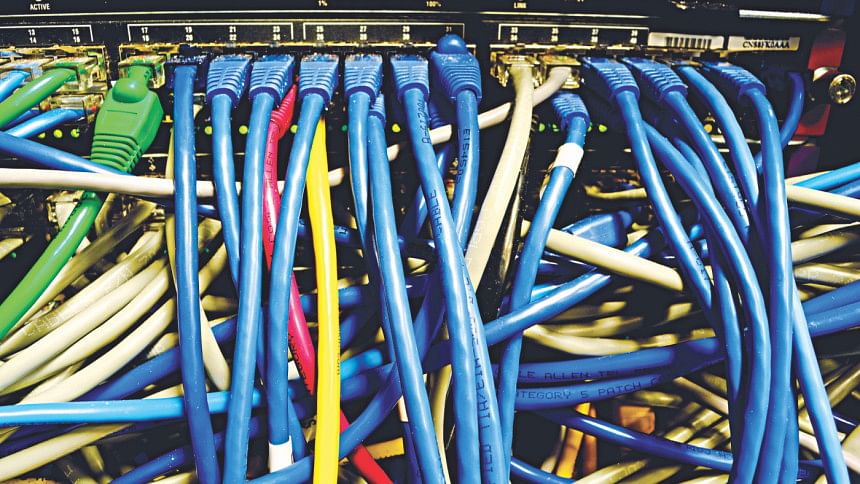Vanishing boundaries of digital privacy

Your only recollection is that a few days ago, you had exchanged a text with your friend about getting together for a quick morning chat. From that single exchange of information, the ever-helpful and always-listening ubiquitous virtual assistant has set up a new routine, without giving away much to let you know of the steps it has taken. Would you consider this convenience as a breach of your privacy? Sure, there is no human contact involved in this, but what if it was done by an unknown person?
Let's take a different approach altogether in visualising this — how much are you willing to give up about yourself to use technology and make the best use of its benefits? Opening an account for minimum services anywhere requires you to enter your personal details, which may include mandatory fields asking about your location, age, and address. Add to the fact that these are stored and analysed by machines with little to no human contact for purposes unknown or buried underneath roughly sixteen pages of "Terms and Conditions of Usage."

DIGITAL LOOPHOLES OF A HUMAN RIGHT
Privacy is a fundamental human right, as mentioned by the UN Declaration of Human Rights, the International Covenant on Civil and Political Rights, and in many other international and regional treaties. Interest in the right of privacy increased in the 1960s and 1970s with the advent of information technology. The surveillance potential of powerful computer systems prompted demands for specific rules governing the collection and handling of personal information.
The text book definition of Privacy in the Internet age goes along the lines of stating the concept as a claim of individuals to be left alone, free from surveillance or interference, from other individuals or organisations, including the state.
Advances in data storage techniques and rapidly declining storage costs have been responsible for maintaining a database on individuals by private and public organisations. These advances in data storage have not only made the routine violation of individual privacy cheap, but effective as well. Furthermore, advances in data analysis techniques for large pools of data is another technological trend that heightens ethical concerns. Profit mongering companies, and government agencies are able to find out highly detailed personal information about individuals with unprecedented ease.
Internet technology has posed new challenges for the protection of individual privacy. Any information that is sent over this vast network may pass through many different computer systems before it reaches its intended final destination. Each of these systems is capable of monitoring, capturing, and storing communications that pass through it.
It has not been an overnight development in blurring the lines between virtual and real-life privacy, but the progress has been astonishingly fast. From the rise of Facebook as the all-engulfing social media platform, and the hub of connectivity to the smart devices that capture, record, and attempt to predict a particular behaviour of the user — there is no end to the possibilities of how a person can be exploited digitally in the cybersphere.
SURVIVING AS A NON-TECHIE
Being technologically handicapped and trying to lead a modern life in 2020 is as good as being unvaccinated and wandering in a disease stricken area. There is simply no way around being connected and using the digital communication platforms to get-by every day.
But there is one fact you have to accept when you partake in this 'connection.' From cell phones to the home, and office computers and devices, right down to the so-called smart devices to make your life less difficult, you are leaking information about yourself in miniscule to somewhat large chunks.
Ask yourself this: do you really need a device to open up curtains in the morning, and does your refrigerator really need to be controlled by your smart phone? Also, do you have to make your smartphone a witness to your many activities throughout the day which you would not dare to let a single living soul know of? That Wi-Fi connection with no password might be tempting and have excellent connectivity – but are you sure you want to use it? As the situation stands, one may feel a wave of despair engulfing them, as just about every connection to the Internet is a potential for breaching one's privacy and security, both online and offline. However, technology itself is not the problem, it is how you use it, and more importantly, who is at the other end that matters most. It's not only criminals who are interested in getting their hands on your data. The problem grows further when the devices serve the companies who made them rather than the people who purchased them. And as our everyday vehicles and our habitats, our jewellery and our kitchen appliances become equipped with digital connections and capabilities, the question of control becomes only more significant.
While companies are not looking to hack your password, they want to know a lot about you. From your buying patterns to how you travel, and how you utilise your time, and what attracts your attention in a particular website — these are all vital variables to achieve maximum profit for the companies out there. And they will target every possible grey area in the rules and conditions of cyberspace to reach and extract information from their target audience. In short, your online identity is being constantly impinged upon, probed, evaluated, examined, and recorded.

Then, there are all the social networking sites and services, which are the lifeblood of 21st century life and communication. The year 2019's highlight were Facebook's massive privacy mishaps, and the hefty fine associated with it. And yet, the 2.45 billion worldwide monthly active users of this platform continue on with their photo sharing, messaging, and sharing their comments and opinions, all because this service does not cost anything monetarily. That ever-popular quote is quite appropriate here — "If you're not paying for it; you are the product."
The best possible way to not drown in this is to be aware of what you are doing. You are already a well-curated data set, with a timeline that includes everything about you, from your eating habits to your gradual change in appearance to how many times you have passed a certain landmark. Your survival in this landscape depends on the thumb rule of not sharing any more than you normally would to someone in real life. As for being the product by just using a free service, try keeping it in mind that if it is too good to be true, then it probably is.
THE STANCE OF THE NETIZEN
There was once a time when being part of the Internet had its own bragging rights. The connectivity, the ability to share files without physical boundaries, and not to mention the unprecedented information exchange — these were treated as the technological evolutions that would spearhead the fourth industrial revolution. Little did users know that picture was far from what it would morph into.
As times are now, modern advanced users have been conscious of their digital profile, and to what degree it can be misused. No matter how secure their operating systems may be, or how careful they are with their search engine usage, or how aware they are of the information being collected about them — these users, too, are not free from being counted for as data points.
It is simply no longer a viable option to drop off the Internet, and lead a life off-grid as a functional human being. But here is a thought to ponder — the Internet is fully decentralised; it is basically a network system which has no owner. This, in turn, means that any information that is on the Internet does not have an owner, and is collectively accessible and usable by any user accessing the Internet. This again puts the question of privacy and ownership of material in the spotlight.
Privacy, or the lack thereof, has been the cause of many diatribes and discussions over the last decades. On the one hand, the movie and music industry suffer greatly from illegal file sharing of their output, and on the other hand, general users are being used as data to feed into data warehouses. From artwork and photographs being used without any permission from the creators, to targeted advertising which are still being argued over for their invasive coding, there is still no visible and direct action for change.
In this situation, it is the netizens who must demand this change. One foundation in particular — the Mozilla Foundation, has a strong voice in this. This non-profit foundation actively encourages users of its browser – Firefox, and other services, to be more aware of the system that makes up most of one's digital life.
The digital serfdom that has engulfed the world is now a reality that seems almost foretold by numerous sci-fi series and movies! With the circumstance being, as such, a quote from American philosopher Henry David Thoreau, seems apt here — "Men have become the tools of their tools." This observation was made back in the 1800s, and with today's ever-transforming digital landscape, the meaning of this statement is only amplified in its entirety. The tool that is the Internet and all things digital, while astounding, also have the potential to enslave us as a society.
While this has been a dark picture that has been looming over people of the digital realm, privacy has been a hot topic of discussion. In the recent CES technology conference, held in January, 2020, several of the biggest tech companies that were in attendance, put a special emphasis on user privacy. Following years of mounting scrutiny from regulators and consumers over the industry's handling of personal data, as consumers have become more aware and concerned about the issue. The companies themselves are opting to be part of the solution instead of creating problems. Ultimately, the privacy framework will depend on the collective willingness of governments and tech giants to listen to the pulse of the emerging global digital economy, and to recognise the need for strong protection of privacy.

 For all latest news, follow The Daily Star's Google News channel.
For all latest news, follow The Daily Star's Google News channel. 



Comments